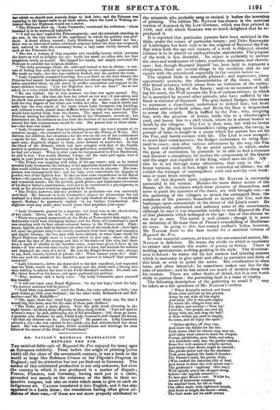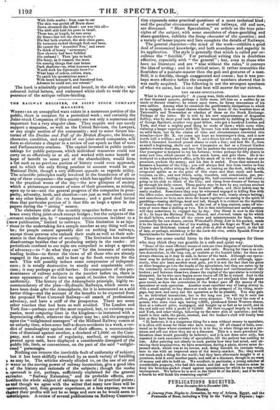MR. NAYLOR'S METRICAL TRANSLATION OF REYNARD THE PDX.
Tim satirical fable-epic of Reynard the Fox enjoyed for many ages to European celebrity. From before the origin of printing (circa 1450) till the close of the aeventeeth century, it was a book to the world at large like Robinson Crusoe or the Pilgrim's Progress in England; and its attraction has not yet died out in Germany. The author of this celebrated production is not only unknown, but even the country in which it was produced is a matter of dispute ; France, Flanders, and Germany, having each put in a claim, grounded not merely on the existence of the fable in their re- spective tongues, but also on traits which seem to give to each an indigenous air. CARTON translated it into English, and it has also appeared in a Latin dress ; the translators having often given ad- ditions of their own,-'if these are not more properly attributed to the minstrels who probably sang or recited it before the invention of printing. The edition Mr. NAYLOR has chosen is the metrical version of ALRMAR in the Low-German, which was first printed in 1498, and with which GOETHE was so much delighted that he re- produced it. It is reported that particular persons have been satirized in the fable, under the names of particular beasts ; and Duke REINHARD of Lotbringen has been said to be the original of Reynard the Fox. But when both the age and country of a work is disputed, slender reliance is to be placed on such particular statements. The purpose of the work is less doubtful. Its object is evidently to satirize the vices and weaknesses of rulers, courtiers, ministers, and church- men : but, though Reynard himself has been held to represent a clergyman, there are several things in his condition that do not square with the priesthood, especially in the version before us. The original fable is naturally planned ; and represents, where opportunity permits, the characteristics of the times, with all that broad accuracy which arises from an imitation of the reality. The Lion is the King of the Beasts ; and on an occasion of hold- ing his court, the Wolf accuses the Fox of various crimes; in which he is seconded by several other animals, who have suffered by the fraud or violence of Reynard. The gray-haired Badger, who seems to represent a churchman, undertakes to defend him; but fresh
evidence arrives of fresh crime, and Bruin the Bear is despatched to arrest the culprit. He is based by the Fox ; who, tempting him with the promise of honey, leads him to a wheelwright's
yard, and leaves him in a cleft trunk, where he is almost beaten to death by the villagers. The Cat is then sent, but with no better success: by playing upon Grimalkin's ruling passion, the envoy, in pursuit of mice, is caught in a noose which the parson has set for the Fox, and barely escapes with life. The Lion is now enraged; to avert fatal consequences, the Badger undertakes to bring Rey- nerd to court ; and, after various adventures by the way, the Fox is heard and condemned. By an artful speech, in which, under the guise of confession, he pretends to be able to find a treasure and discover a conspiracy, he excites the compassion of the Queen and the anger and cupidity of the King, which save his life. Afy this he is led through many adventures, that vary iu the / ferent versions, and, in fact, might be extended ad libitum; bu, all exhibit the triumph of unscrupulous craft and activity over weak- ness or mere brute strength. In all that depends upon judgment Mr. NAYLOR is eminently successful in his version. Besides the more direct action of the Beasts, all the incidents which form pictures of themselves, and serve to paint the manners of the times, are well brought out,—as the gathering of the villagers to attack the entrapped Bear, the summons of the parson's household to destroy the Cat, and the burlesque upon ceremonials in the forms of the Lion's court. He has judiciously shortened and softened some of the occurrences,
although he says it was impossible totally to weed Reynard the Fax
of that plainness which belonged to the age : but of this dictum we are not so sure. The metre is well chosen ; though it is more an imitation of BUTLER than of Paioa's remodelling of Eludibraa- tic verse. In going to this last-named author's Tales, however, Mr. NAYLOR went to the best model for a metrical version of Reynard the Fox. In more essential matters, at least in the one essential matter, Mr. IslayLoa is deficient. He wants the vie'ida t'is which is necessary to attract and sustain the reader of poetry or fiction. There is nothing spontaneous, nothing gushing in his style. The facetious- ness is forced : he wants the sly but earnest and trusting manner, which is necessary to give spirit and effect to narrative and htble of this kind, or even to point the satire. His versification is often lame, and often laboured; he sometimes makes one line for the sake of another ; and he has mixed too much of modern slang with his version. There are other faults of detail, but it is not worth while to pursue them : the pervading fault is a want of vitality. The following description of the gathering to assail B may be taken as a fair specimen of Mr. NAYLOR'S version.
" When Rustyfile arrived, and found
Bruin close pris'ner on his ground, Away he ran with all his might And main (fcr it was gala-night) To where the villagers were met For dance and revelry—' Now let,' Cried he, the people, one and all, Along with me, and stop the ball! A Bear within my yard is caught, So come, and all enjoy the sport !'
" Helter-skelter, off they run, And leave the fiddles for the fun. Each seizes what he chance may step on, And takes what comes to hand for weapon. Prongs, pitchforks, axes, flails, and rakes, Are snatched—and, last, the garden-stakes ; Some few well-seasoned cudgels carried, And thick—that Bruin might be harried: The parish-priest and eke the chorister Took arms against the limbo'd forester : The Parson's maid, the pretty Jude, (Who cooked the daintiest dish of food, And knew to brew the well-spiced cap— The goodman's ' nightcap' after sup,) With spindle arm'd she skipped along, Intent—the roguish amazon !— To lace poor Bruin's coat. Whilst he, Aware of boisterous company,
On mischief bent, for life or death One effort made, with tightened breath, And freed at length his snout—albeit, The limb made not its swift retreat
With little scathe: from nose to ear The skin was peeled off Bruin sheer.
Down streamed the blood : nor was this all—
The cleft still held his paws in thrall.
These too, at length, he tore away By force—but left the claws to stay! His feet both crushed, the skin clean gone, By torments racked through flesh and bone, He cursed the ' scoundrel Fox,' and swore To think of honey nevermore.' How cleverly had been fulfilled His embassy ! Then 'gan to build His fancy, as it roamed, the more On coming things that cast before Dark shadows—as, what honours now Would deck his diplomatic brow ?— What hope of orders, collars, stars, To patch his ignominious scars ? With beard besmear'd, and foundered feet, Advance he could not, nor retreat."
The book is admirably printed and bound, in the old style ; with coloured initial letters, and embossed white cloth to wear the ap- pearance of the antique vellum-binding.



























 Previous page
Previous page